Review: Circle Players' HAIR Captures a Moment in Time With Absolute Confidence
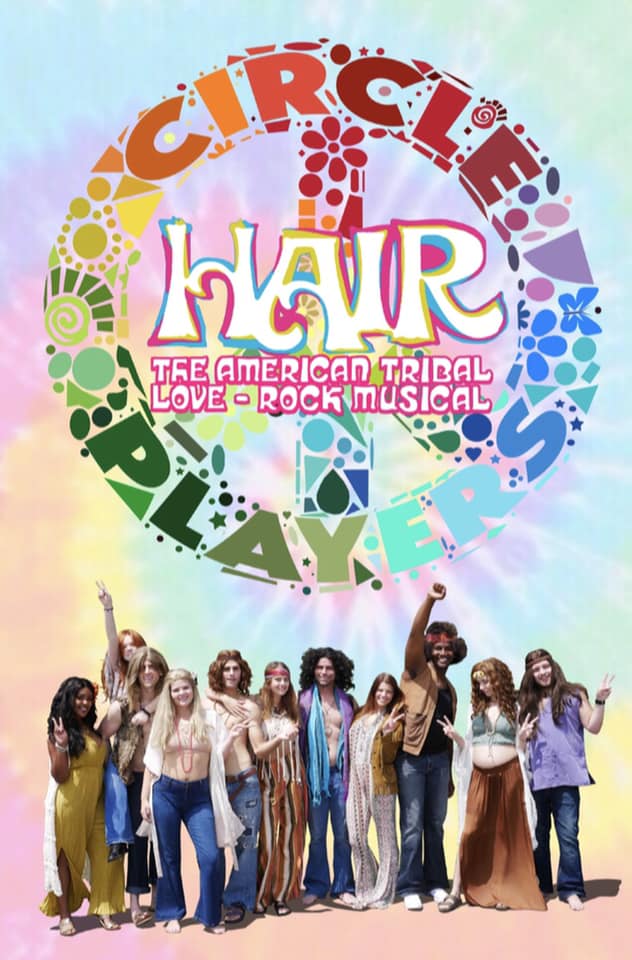 Nashville theater is having its 1968 moment, apparently, thanks to the production of Hair, which continues Circle Players' 69th season in high-flying style, and which followed the closing of The Boys in the Band (for the sake of full disclosure, this critic produced and directed that one). Together, the two works are exemplars of how theater's impact can be far-reaching, long-lasting and historically noteworthy.
Nashville theater is having its 1968 moment, apparently, thanks to the production of Hair, which continues Circle Players' 69th season in high-flying style, and which followed the closing of The Boys in the Band (for the sake of full disclosure, this critic produced and directed that one). Together, the two works are exemplars of how theater's impact can be far-reaching, long-lasting and historically noteworthy.
In the case of Hair, The American Tribal Love-Rock Musical, which was the first musical of its genre to premiere on Broadway, the intervening half-century since the show's debut has proven its worthiness, its ability to capture - like so much lightning in a bottle - a particular moment in time that is both elucidating and inspiring. Director Jason Lewis and his creative team (which includes musical director Emily Dennis, choreographer Tosha Pendergrast, producer Leslie Berra, lighting designer Daniel DeVault and costumer Denese Kelley, among others) exhibit a mind meld of psychedelic proportions as they bring 1968 to life on the stage of the Z. Alexander Looby Theatre with enormous spirit, breathtaking energy and so much heart you'll leave the theater in search of bell bottoms, fringed leather vests and the best weed money can buy.
In short, Hair is a great big hit on the symbolic and mostly imaginary bong that is theater in Music City - or anywhere else artists come together to share the largesse of their own indomitable spirits. The resulting production will leave you inspired, maybe even more readily equipped to deal with the realities of life in the 21st century, proof that no matter how much times have changed, they remain stultifyingly the same. While our prejudices and biases may have been altered by the social upheaval of the 1960s and the decades that followed, introspection reveals that we only have refocused our baser instincts on issues of equal significance. The play's much-vaunted nude scene remains intact, but we suspect the subdued lighting renders it benignly acceptable to even the most prudish audience member.
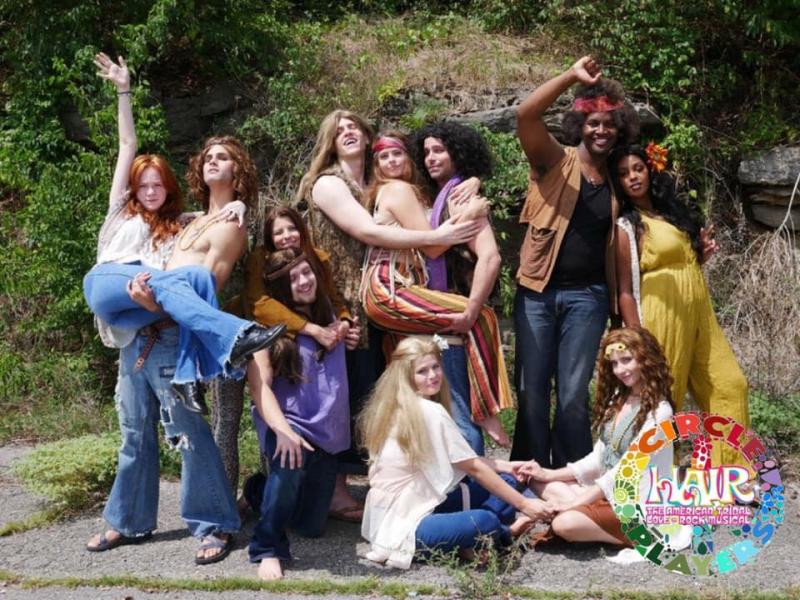 As difficult as that realization may be to fathom, it's an unfortunate and accurate assessment of the world in 2018, some 50 years after Hair - inspired by the counterculture revolution engendered by the hippie movement of "flower children" and others of their ilk and the sexual revolution of the latter part of the decade of the 1960s - burst upon the theatrical scene to challenge convention and to hold a mirror up to society's foibles even while a sense of peace, love and brotherhood (sorry, sisters, your time was still to come, no matter how forward-thinking some folks were back in the day) sought to gain hold and exert influence.
As difficult as that realization may be to fathom, it's an unfortunate and accurate assessment of the world in 2018, some 50 years after Hair - inspired by the counterculture revolution engendered by the hippie movement of "flower children" and others of their ilk and the sexual revolution of the latter part of the decade of the 1960s - burst upon the theatrical scene to challenge convention and to hold a mirror up to society's foibles even while a sense of peace, love and brotherhood (sorry, sisters, your time was still to come, no matter how forward-thinking some folks were back in the day) sought to gain hold and exert influence.
In Hair, composer Galt McDermot and lyricists Gerome Ragni and James Rado (who also teamed up for the musical's book) created a musical to reflect the growing sense of how life in America must change in order that everyone be treated equitably and to recognize the increasingly politicized younger generation's desires to effect change in the world and to instill in people globally the belief that everyone is worthy of love and respect. The show's memorable score, which sounds as vibrant today as it did in 1968, spawned any number of hits that topped contemporary music charts at the time, with recordings by artists like The Cowsills, The Fifth Dimension, Shirley Bassey, Diana Ross and others ensuring the songs are now considered part of the American songbook of musical standards.
Eradicating the world of racism, sexism and every other "ism" known to exist in those times - or now - may have been their ultimate goal, but for many outsiders it appeared that young people were only interested in getting high, f-ing whomever they wanted to without societal restraints and forgoing the social obligations of the past to forge their own route forward into the not-too-distant future of a new century still to come.
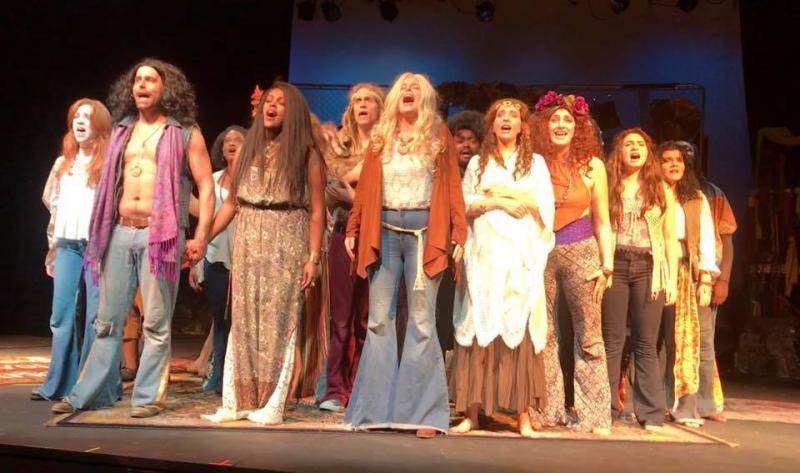 In its day - its original day, considering the timeliness of the musical and its universal story that reverberates just as provocatively in 2018 as it did in 1968 - Hair challenged the conventions of musical theater, refusing to tell a story by rote with structure and characters practically set in stone by what had come before, choosing instead to introduce audiences to a rocking new genre in which popular musical tropes were employed to tell a story of immediacy and importance.
In its day - its original day, considering the timeliness of the musical and its universal story that reverberates just as provocatively in 2018 as it did in 1968 - Hair challenged the conventions of musical theater, refusing to tell a story by rote with structure and characters practically set in stone by what had come before, choosing instead to introduce audiences to a rocking new genre in which popular musical tropes were employed to tell a story of immediacy and importance.
Much like other landmark Broadway musicals before it - Show Boat, the Jerome Kern musical inspired by Edna Ferber's novel that set musical theater on its ear with its artful blend of storytelling and musical numbers, comes readily to mind - Hair brought a racially integrated cast to the Broadway stage, indicative of the growing acknowledgement of racial inequality in a time of great change in this country.
And thanks to Lewis and his creative team's obvious desire to tell the musical's story within the framework of life in today's world (however daunting that may be, regardless of one's perspective), while paying heed to Hair's historic significance, audiences in Nashville can bask in the production's pervasive and palpable sense of respect for all earthly creatures and the abiding love which can prevent one tribe from killing another just to prove its dominance.
Lewis' concept for Hair retains every bit of its original import, yet he adroitly manages to give the 50-year-old musical a refreshing contemporary flavor that ensures every character, every line, every song and every scene hits its target with unerring precision. DeVault's exquisite lighting design for the Circle Players production beautifully illuminates the proceedings, giving Hair the glow of both nostalgia and the very moment in which you see the show, while Kelley's costumes clad each character with the raiments of a particular fashion-conscious moment in 1968 during which clothes represented the wearer's individual tastes to validate their counterculture bona fides.
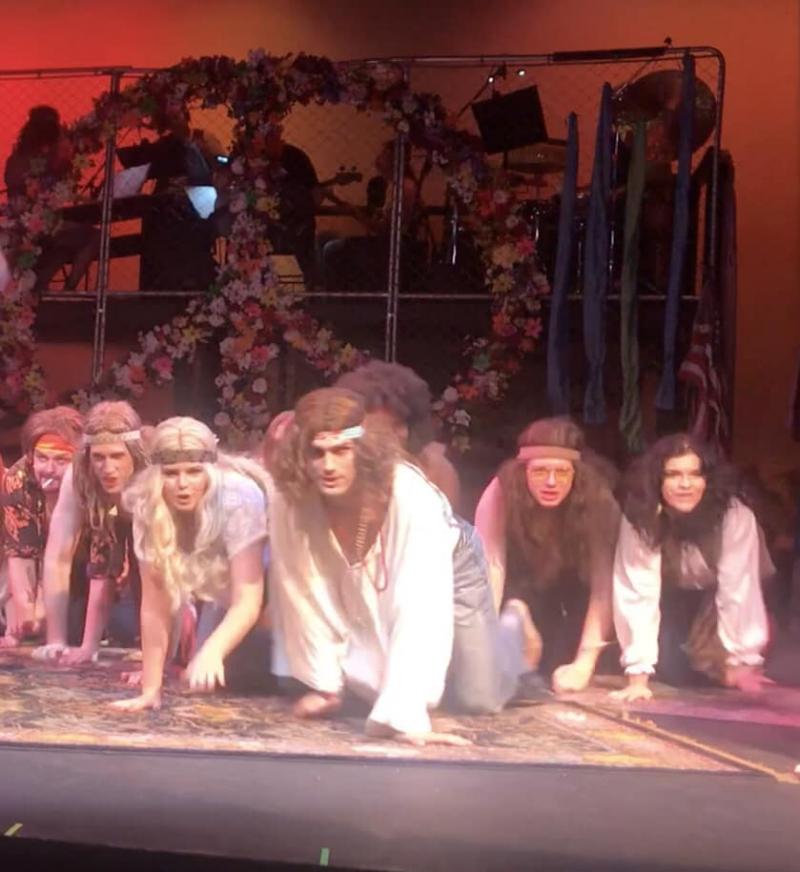 Pendergrast's choreography is electrically charged and fluid - and when coupled with Lewis' almost cinematic direction - keeps the story moving ever forward and calling upon the cast to keep up the pace throughout the two-and-one-half hours of unbridled joy and glee. Perhaps most compelling is the sequence in Act Two, during which we are taken along for the ride as the show's protagonist Claude Dubowski takes a particularly other-worldly trip thanks to a joint laced with some psychotropic additive that lays waste to his being. Imaginatively staged and stimulating (on both physical and intellectual bases), the sequence encapsulates what life was like in 1968, when the horrors of war were brought home to Americans every night thanks to the evening network news broadcasts.
Pendergrast's choreography is electrically charged and fluid - and when coupled with Lewis' almost cinematic direction - keeps the story moving ever forward and calling upon the cast to keep up the pace throughout the two-and-one-half hours of unbridled joy and glee. Perhaps most compelling is the sequence in Act Two, during which we are taken along for the ride as the show's protagonist Claude Dubowski takes a particularly other-worldly trip thanks to a joint laced with some psychotropic additive that lays waste to his being. Imaginatively staged and stimulating (on both physical and intellectual bases), the sequence encapsulates what life was like in 1968, when the horrors of war were brought home to Americans every night thanks to the evening network news broadcasts.
But perhaps what sets Circle Players' production of Hair apart from other musical theater productions is its remarkable cast, brought together under Lewis' vision to play their fictional counterparts to tell a story as prescient today as it ever was.
Leading Lewis' cast as Berger, the leader of the band of counterculture flower children who inhabit the streets and parks of New York City in 1968, is James David West, whose total embodiment of his character is nothing short of startling and awe-inspiring. West so effectively becomes his character that it's hard to ascertain where David leaves off and where Berger begins. He commands the stage with confidence, proving himself the charismatic mirror image of his fictional doppelganger. The musical pastiche that opens the show would be far less impressive and much more pedestrian if not for his astounding, even overwhelming, stage presence.
Likewise, Nicholas Page is impressive as the somewhat more innocent, somehow less worldly Claude, the diffident teenager whose lack of ambition and direction vex his overbearing parents and whose indecision leads him to a fate ordained from the very start of the play (the moment in which that plays out onstage is heart-shattering in its intensity). Page's Claude is sexy and vital, to be sure, but the actor imparts a sense of newfound discovery throughout the character's interactions with the other members of the tribe. His performance of "Manchester, England" - if recorded and released - would likely top the charts.
Conductor/musical director Emily Dennis and her band of five musicians (Stephen Burnette on piano, Dale Martin Herr on guitar, Tom D'Angelo on bass, Raymond Ridley on reeds, and Dennis Palmer reliably on percussion) provide expert musical accompaniment for the cast and their performance of the iconic Hair score is, quite frankly, spectacular, proving the worth of live players in the orchestra pit of every musical theater production in "Music" City.
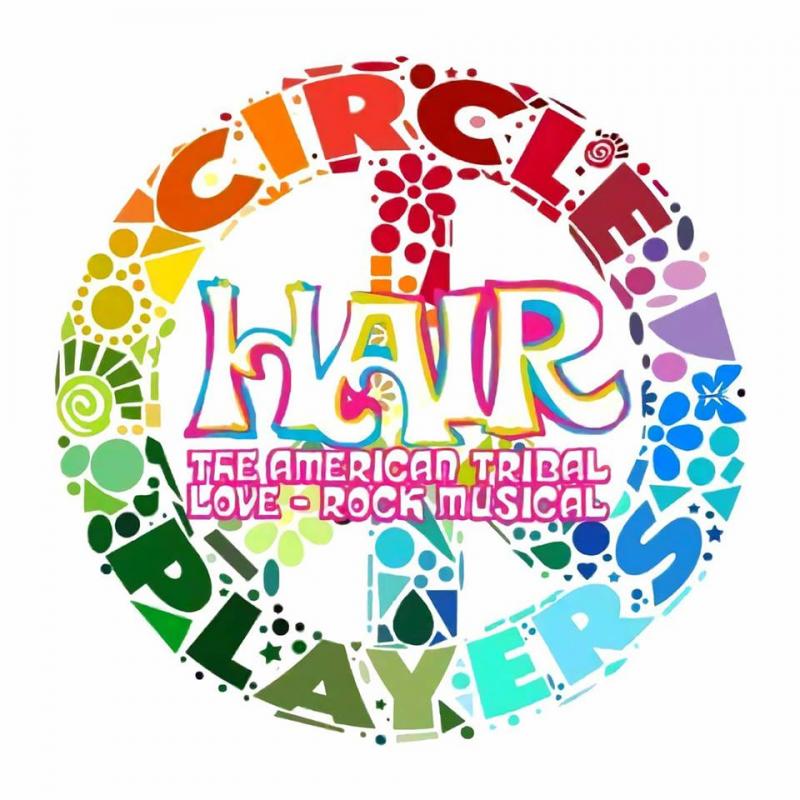 West and Page are surrounded by a committed cast of supporting players who bring their characters to life with uproarious glee and profound focus. Amanda Grace Creech is terrific as Sheila, the star-crossed young woman who longs for Berger while being the focus of Claude's affections. Her performance of "Easy to Be Hard" is almost heartbreaking, to be sure, but it's her rendition of "Good Morning, Starshine" that will be best remembered after the show's final curtain has rung down. Maggie Wood is wonderful in the role of the pregnant Jeanie, easily morphing into her character (her own, real-life pregnancy notwithstanding) and the anguish expressed in her unrequited love for Claude reverberates long past its onstage expiration.
West and Page are surrounded by a committed cast of supporting players who bring their characters to life with uproarious glee and profound focus. Amanda Grace Creech is terrific as Sheila, the star-crossed young woman who longs for Berger while being the focus of Claude's affections. Her performance of "Easy to Be Hard" is almost heartbreaking, to be sure, but it's her rendition of "Good Morning, Starshine" that will be best remembered after the show's final curtain has rung down. Maggie Wood is wonderful in the role of the pregnant Jeanie, easily morphing into her character (her own, real-life pregnancy notwithstanding) and the anguish expressed in her unrequited love for Claude reverberates long past its onstage expiration.
Surrounding the four leading characters, if you will indulge my reference to them as such, are some equally capable actors given a chance to display their own ample talents. It's the voice of Lindsey Kaye, as Ronny, you first hear when the lights dim to signal the start of the show and it's her voice that will soar toward the heavens in musical numbers to follow. Erica Patterson's own angelic voice is heard throughout the show and she exudes throughout her performance the confidence every leading player hopes to attain every time she sets foot onstage.
Barrett Thomas is engaging as Woof, the tribe member most likely to become a stalker of Mick Jagger, and he displays a great deal of heart in the process. George Hardimon IV is equally impressive as Hud, moving about the stage with the formidable force of his personality, and Hilarie Spangler and Scotty Phillips are quite good as Claude's parents and fellow tribemembers, and the remainder of the ensemble deliver laudable performances ("Black Boys"/"White Boys" affords the ensemble one of its best moments). But, in what's come to be expected from him, Blake Holliday very nearly steals the show out from under every other person onstage with his showstopping turn as Margaret Mead, which is worth the price of admission.
Circle Players' Hair runs for only nine more performances, which is usual in local theater parlance, but we suspect it won't be enough for all the audiences who should be clamoring for tickets. Whatever you do, don't miss it!
Hair, The American Tribal Love-Rock Musical. Book and lyrics by Gerome Ragni and James Rado. Music by Galt McDermot. Directed by Jason Lewis. Musical direction by Emily Dennis. Choreography by Tosha Pendergrast. Presented by Circle Players, at The Z. Alexander Looby Theatre, 2301 Rosa Parks Boulevard, Nashville. Through October 21. For tickets and for further details, go to www.CirclePlayers.net. Running time: 2 hours, 40 minutes (with one 15-minute intermission).
Videos
